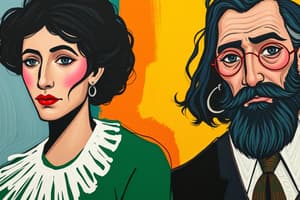Podcast
Questions and Answers
What is characterization?
What is characterization?
the techniques an author uses to build understanding of a character
What is symbolism?
What is symbolism?
the use of symbols to represent ideas or qualities
What is theme?
What is theme?
the message conveyed by a text that applies to multiple other texts
What is a motif?
What is a motif?
What is a commune?
What is a commune?
What does emblematic mean?
What does emblematic mean?
What is the root word of chronically?
What is the root word of chronically?
What does khronos (Gk) mean?
What does khronos (Gk) mean?
What is the root of perspective?
What is the root of perspective?
What does Specere (L) mean?
What does Specere (L) mean?
What is situational irony?
What is situational irony?
What is verbal irony?
What is verbal irony?
What is dramatic irony?
What is dramatic irony?
What does Gogol do at the beginning of chapter five?
What does Gogol do at the beginning of chapter five?
Where does Gogol come up with the idea to change his name?
Where does Gogol come up with the idea to change his name?
Who are the first people to call Gogol by his new name?
Who are the first people to call Gogol by his new name?
What is the purpose of the repetition on page 108?
What is the purpose of the repetition on page 108?
What class does Gogol not tell his parents he is taking?
What class does Gogol not tell his parents he is taking?
What do Gogol's parents want him to be?
What do Gogol's parents want him to be?
What do Sonia and Ashima argue about?
What do Sonia and Ashima argue about?
Describe Ruth's upbringing. How is it different from Gogol's?
Describe Ruth's upbringing. How is it different from Gogol's?
Why doesn't Gogol tell his parents about Ruth?
Why doesn't Gogol tell his parents about Ruth?
What is an ABCD?
What is an ABCD?
What story does Ashoke tell Gogol at the end of chapter five?
What story does Ashoke tell Gogol at the end of chapter five?
What is the significance of the quote regarding name changes?
What is the significance of the quote regarding name changes?
What does Gogol learn about Gogol's lifelong unhappiness?
What does Gogol learn about Gogol's lifelong unhappiness?
What is the significance of the quote about Gogol’s feelings towards his name?
What is the significance of the quote about Gogol’s feelings towards his name?
What does Gogol long for in the quote about his inability to picture someone at the kitchen table?
What does Gogol long for in the quote about his inability to picture someone at the kitchen table?
What does Gogol wish for as he parts with Ruth?
What does Gogol wish for as he parts with Ruth?
What does Gogol tell Ruth about the tea?
What does Gogol tell Ruth about the tea?
Study Notes
Literary Terms
- Characterization: Techniques used by authors to develop characters' personalities and traits.
- Symbolism: The practice of using symbols to convey deeper meanings or represent ideas and qualities.
- Theme: The underlying message or central idea in a text, often reflecting a conflict or argument, and cannot be encapsulated in a single word.
- Motif: A recurring element or idea that has significance in a literary work.
- Commune: A group of people or families living together, sharing resources and responsibilities.
- Emblematic: Representing or symbolizing something else.
Etymology
- Chronic: Derived from the Greek word "khronos," meaning time.
- Perspective: Traced back to the Latin "Specere," meaning to look.
Irony Types
- Situational Irony: Occurs when the outcome is opposite of what is expected.
- Verbal Irony: When words are used in a way that conveys a different meaning than what is literally said.
- Dramatic Irony: A situation where the audience knows more than the characters do.
Gogol’s Journey
- Gogol starts chapter five by deciding to change his name at the courthouse.
- The inspiration for the name change comes from an article titled "Second Baptisms."
- His college suitemates, Brandon and Jonathan, are the first to use his new name.
Family Dynamics
- Gogol keeps his art class a secret from his parents, ironic due to his grandfather’s artistic background.
- His parents envision careers for him as an engineer, doctor, lawyer, or economist, showing cultural expectations.
- Sonia and Ashima argue over Sonia's desire for additional piercings, hinting at generational differences.
Relationships
- Ruth, raised in a commune, has a vastly different upbringing compared to Gogol's traditional family life.
- Gogol avoids telling his parents about Ruth to escape their concerns regarding his choice to date outside his culture.
Cultural Identity
- The term ABCD refers to “American-born, confused Deshi,” highlighting the dual identity struggles of American-born children of Indian immigrants.
- Ashoke shares a personal story about the train accident and Gogol's name, connecting personal history to identity.
Quotes and Significance
- Gogol rationalizes his name change by noting historical precedents for name changes among various groups, indicating a personal struggle for acceptance.
- Acknowledgment of Gogol's namesake's genius underlines the pressure of reputation and identity.
- Gogol’s reluctance to interact with Ruth highlights his internal conflict about cultural identity and familial acceptance.
- His feelings for Ruth are evident when he hesitates to ask for her number, illustrating the tension between his desires and cultural expectations.
- Sharing his Indian experiences with Ruth emphasizes Gogol's appreciation for his culture through the lens of his relationship, revealing the complexities of his identity.
Studying That Suits You
Use AI to generate personalized quizzes and flashcards to suit your learning preferences.
Description
This quiz covers key literary concepts from Chapter 5 of 'The Namesake'. It includes important terms such as characterization, symbolism, and theme, providing definitions to enhance understanding. Perfect for students looking to reinforce their knowledge of literary analysis.




